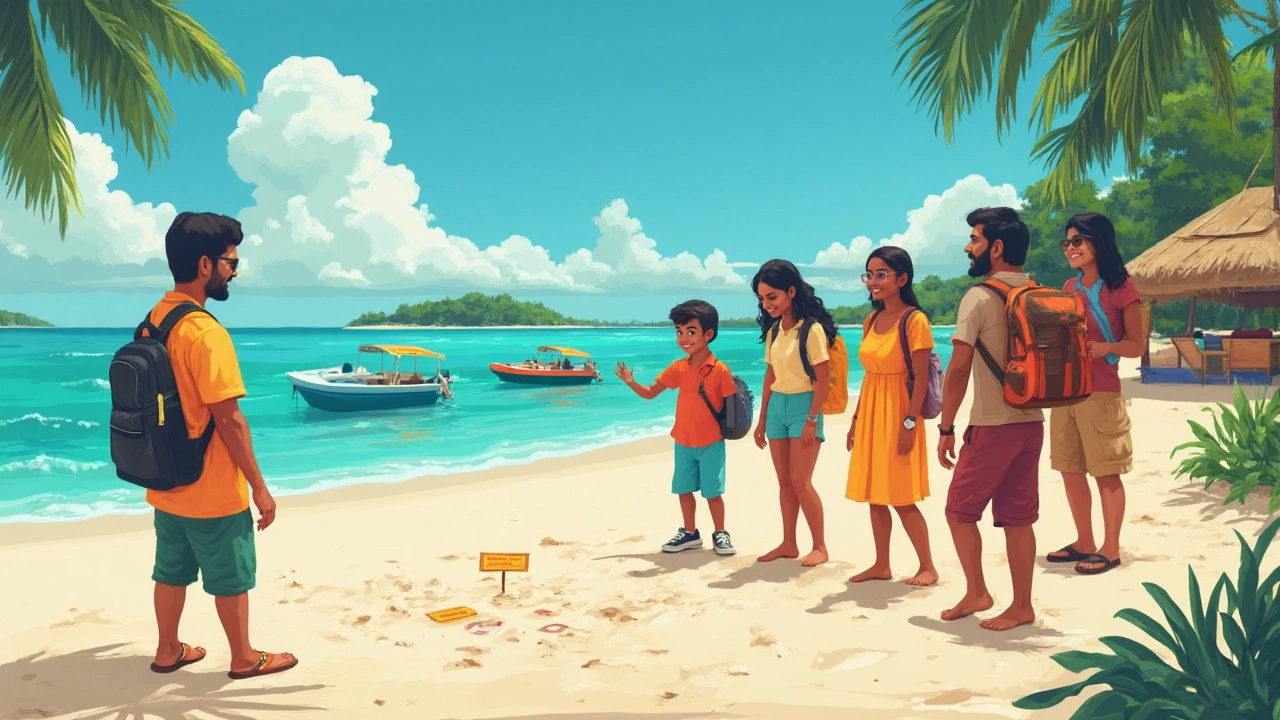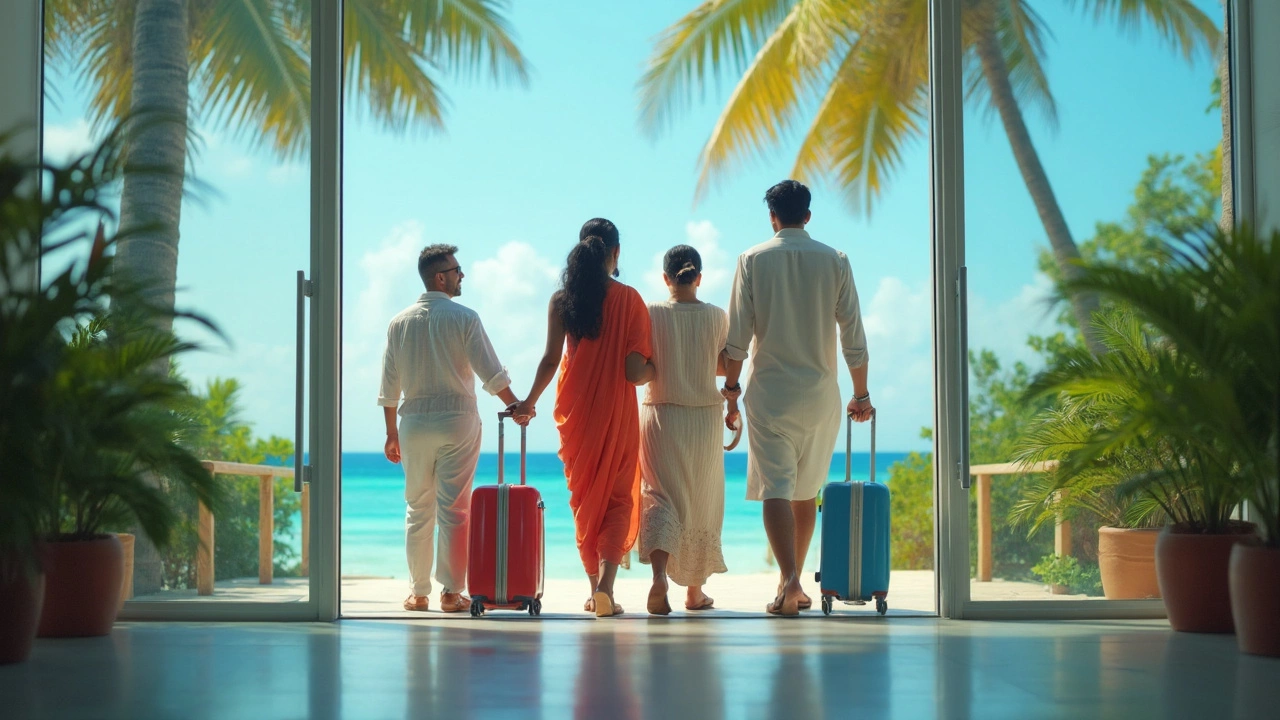Maldives sits at the top of every Indian travel bucket list. Clear water, white sand—you've seen the photos. But is it actually safe, especially for Indian visitors? That's the big question, and honestly, it's not just about theft or scams. Personal comfort, respect, and finding your way in a new culture matter just as much.
The good news: the Maldives earns its reputation as one of the safest countries for tourists. Violent crime here is almost unheard of, especially on resort islands. Most Indian travelers feel at ease walking around, even at night. But there are a few things you should actually pay attention to, and they aren't always obvious at first glance. Knowing the real risks—like sudden ocean currents, health emergencies, or cultural slip-ups—can make your trip as chill as those Instagram posts look.
- Perception vs Reality: Safety in Maldives for Indians
- Common Risks and How to Avoid Them
- Travel Stories: What Indian Tourists Say
- Smart Travel Tips for a Worry-Free Maldives Trip
Perception vs Reality: Safety in Maldives for Indians
There are a bunch of myths flying around about the Maldives, especially when it comes to how welcoming or safe it is for Indian travelers. Some folks imagine stunning resorts with zero worries, while others hear stories about scams or culture shock. So, let's clear the air.
Here’s the real deal: Maldives depends on tourism big time, and India is one of its top sources for arrivals. In 2024, Indian tourists made up about 11% of all Maldives visitors, which is no small number. You'll spot Indians in all types of resorts, budget guesthouses, and at the airport—nobody’s staring or treating you like an alien. Staff in most hotels are used to Indian guests and often go the extra mile because of how frequent these trips are.
| Year | Indian Tourists (approx.) | Total Tourists (approx.) |
|---|---|---|
| 2022 | 241,369 | 1,675,294 |
| 2023 | 211,562 | 1,880,000 |
| 2024 (Jan-Apr) | 73,785 | 634,502 |
Crime targeting tourists is rare. You're a lot more likely to misplace your sunglass case than lose your wallet to pickpockets. Most reported cases involve minor things, like forgetting bags on an airport bench—usually, they're handed right back to lost and found. Violent incidents? Practically non-existent, especially on resort islands where entry is strictly controlled.
- The local Maldivian attitude toward Indians is generally positive, especially on islands where tourism is lifeblood. You’ll hear Bollywood music at beach parties and see Indian veggies in the resort menus.
- Public islands (like Malé, the capital) have their own vibe. They're busy and not always sparkling clean, but safe as long as you stay alert like you would in any city—nothing out of the ordinary for most travelers from India.
Where can things go wrong? Misunderstandings about local customs sometimes cause awkward moments. The Maldives is an Islamic nation, so outside of private resorts, strict rules about dress and behavior apply. This has nothing to do with being Indian—these are rules for all visitors. A quick check of do’s and don’ts before heading to a public beach or mosque saves trouble.
Bottom line: If you’re thinking of booking that beach holiday in the Maldives, you’re looking at a place where the Maldives safety factor works heavily in your favor—especially for Indians. Just follow the local laws, be nice, and you’ll blend in with the rest of the sun-soaked travelers.
Common Risks and How to Avoid Them
Even though the Maldives safety record is solid, you shouldn’t just switch off. Here are the issues that Indians most often bump into—and what to do so you don’t end up learning the hard way.
Petty Theft and Baggage Issues
Resort islands are pretty much crime-free, but if you stay in Male, Hulhumale, or local islands, watch your stuff—especially phones and bags on busy streets or public ferries. Don’t leave your essentials lying out, even on the beach.
Natural Risks: Ocean and Weather
The water looks calm but can be sneaky. Strong currents, sudden waves, and sharp corals surprise even good swimmers. Always check with the resort’s staff before jumping in. From May to October, expect more rainfall; sudden storms can mess up boat trips without much warning.
| Risk Type | How Often | Tip to Stay Safe |
|---|---|---|
| Petty theft (Male, public areas) | Uncommon but possible | Watch your bags, avoid flashy gadgets |
| Ocean currents | Year-round | Swim in marked zones, never alone |
| Food/water bugs | Some cases, mainly on local islands | Bottled water, eat at busy spots |
| Sunburn | Very common | Sunscreen, cover up between 11am-3pm |
| Cultural misunderstandings | Rare but memorable | Dress modestly on local islands |
Health Stuff: Food, Water, Medical Care
Resort food is safe, but on non-resort islands the tap water isn’t for drinking. Stick to bottled. Occasionally, travelers get a tummy bug from local cafes, so go where crowds go (locals know best). The Maldives has decent clinics for minor issues in Male, but serious care means going home—don’t skip travel insurance.
Cultural Slip-Ups
This is a Muslim country. On local islands, wear T-shirts and knee-length shorts outside tourist beaches. No booze off-resorts. Breaking these rules can lead to fines, and a few tourists have gotten in trouble for being too loud or partying in public spaces.
- Hide wallets and passports in room safes.
- Water sports? Use life jackets—currents are no joke.
- Want to take photos? Ask before snapping pics of locals, especially women.
- Pack sunscreen—burns are way more common here than thefts.
Stay smart, and the most trouble you’ll face is picking between snorkeling or napping in the shade.

Travel Stories: What Indian Tourists Say
There’s nothing like hearing from real people who’ve actually been on a Maldives trip from India. Not just influencers and travel bloggers—actual families, honeymooners, and friend groups. Most Indians who visit the Maldives return with glowing reviews about how peaceful and smooth their trip was, especially when staying on resort islands. It’s common to hear folks say that the staff is respectful and used to Indian culture, even serving vegetarian options and understanding little Hindi. Resorts love Indian guests because of the growing number of visitors every year—over 200,000 in 2024 alone, second only to China.
If you hang out in Indian travel forums or peek at TripAdvisor, you’ll notice repeat mentions of how most Maldives safety concerns just don’t play out on actual trips. Tourists say they rarely felt unsafe—even one solo female traveler wrote about how she walked around her island late in the evening without anyone bothering her, though she did mention keeping an eye on her belongings like at any tourist spot.
Folks who tried public ferries or explored the capital, Malé, do point out the difference: it’s busy, less touristy, and feels more like an Indian city—with traffic and a bit of chaos. A few mention that on local islands, it helps to dress modestly because the Maldives is a Muslim country—so don’t expect to hang out in swimsuits except at designated beaches or resorts. Beachwear is totally fine at private hotels, but if you venture into local town markets or mosques, just cover up a bit out of respect.
Some stories mention minor hiccups like settling bills at small cafes, or language gaps when grabbing snacks in Malé, but staff always tried their best to help out. Lost passports or medical emergencies? Consular support in the Maldives is solid, with a dedicated Indian High Commission in Malé, which Indian tourists are really glad about when things go sideways.
And a quick heads up: while beach theft isn’t a huge issue, tourists do recommend using the hotel’s safe for passports and cash. Not because people steal a lot, but just to avoid any last-minute panic if you misplace your stuff before a flight.
Smart Travel Tips for a Worry-Free Maldives Trip
Don't want any surprises on your Maldivian getaway? A bit of planning goes a long way, especially for Indian tourists. Here’s what you seriously need to know if you want zero hassle and more chill time.
- Maldives safety starts with respecting local laws. Unlike many party beaches in Goa or Thailand, Maldives has strict rules on alcohol and attire, especially on local islands (not private resorts). No alcohol in public, and skip the bikinis outside of tourist beaches.
- Pack light clothes, but also cover-ups. If you’re leaving your resort for island-hopping or local sightseeing, wear something that covers shoulders and knees. It’s not just about being polite—locals really expect this.
- Watch for hidden costs. While resorts display prices in US dollars, remember the 12% Goods and Services Tax (GST) and 10% service charge added to almost every bill. Double-check your tab at checkout so you don’t get sticker shock.
- Mobile roaming can drain your wallet. Buy a local SIM card at Malé airport when you land—it’ll save you loads on calls and data.
- If you want strong vegetarian or Jain food options, let your hotel know well ahead of your stay. Some resorts handle special requests well, but others offer just the basics. Self-catering isn’t easy since hardly any non-resort islands have supermarkets like back home.
- Keep an eye on your passport and valuables, even in paradise. Use the hotel safe. While resort theft is rare, it’s not impossible—don’t be the exception to the rule.
- Healthcare is good in Malé but limited on remote islands. Take a basic medical kit (think: band-aids, mosquito repellent, medicines for fever or allergies). For something serious, medical evacuation could get pricey.
Here’s a quick look at some important numbers for travelers:
| Point | Details |
|---|---|
| Emergency Number | 119 for police, 102 for ambulance |
| Indian Embassy | Malé, Contact: +960 3323015 |
| GST on Bills | 12% (as of 2025) |
| Visa | Free on arrival for Indians (valid passport required) |
| Best Months to Visit | November to April (dry season) |
It pays off to arrange airport-resort transfers ahead of time, since speedboats and seaplanes work on strict schedules. Miss your ride and you could be stuck at Malé’s tiny airport for hours—there isn’t a ton to do. Also, keep digital and paper copies of your trip documents in your luggage and on your phone, just in case.
Stick to these tips and you won’t have to sweat the annoying stuff. You can actually enjoy those blue waters and sunsets without a worry in sight.
